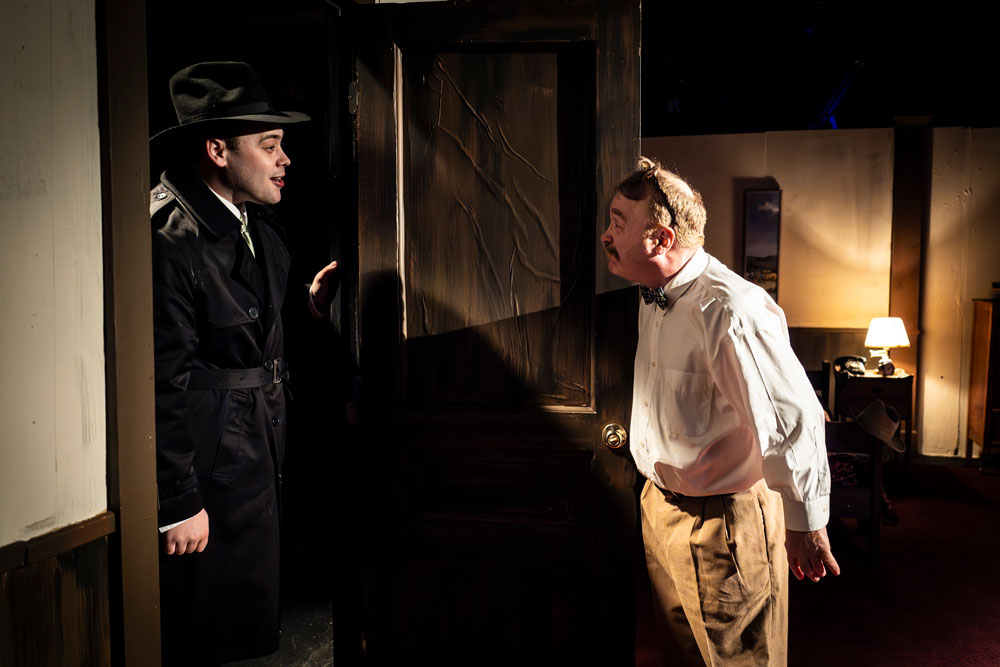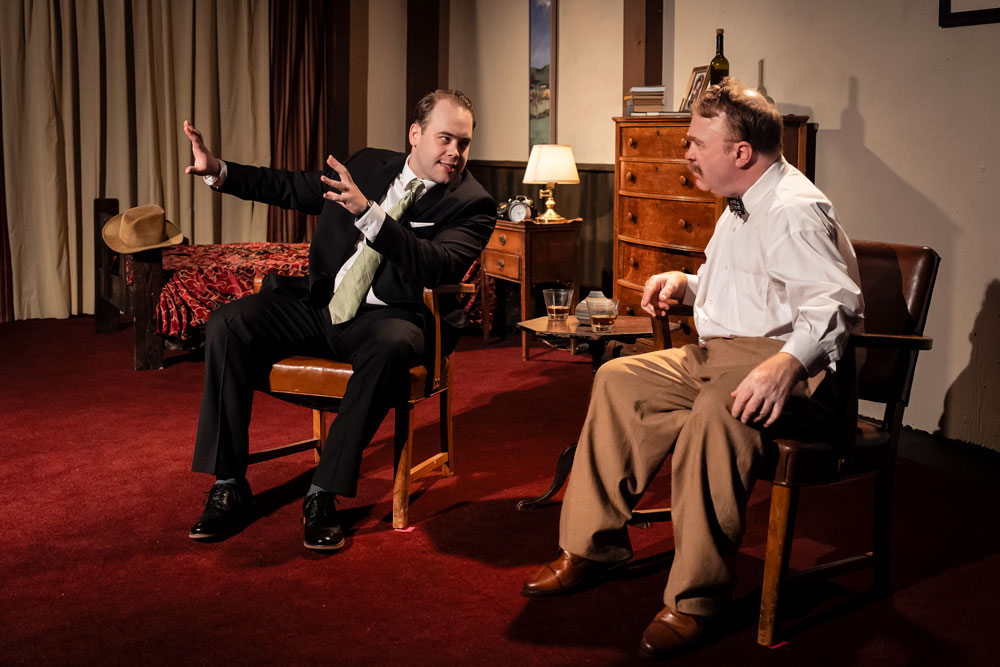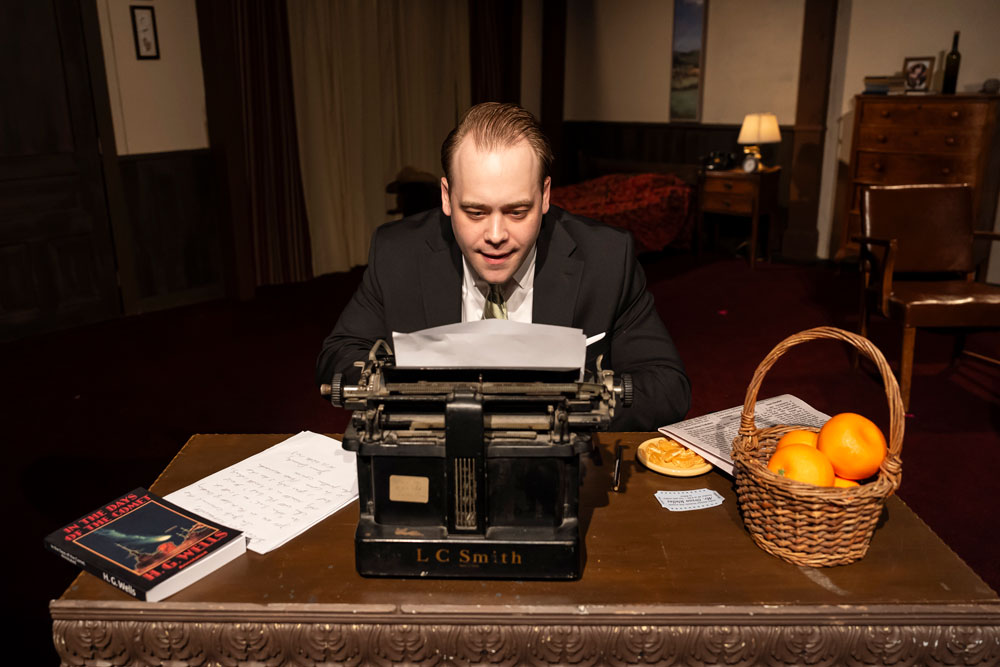
Lucid Theater’s current production of WELLS AND WELLES about an imagined meeting between legendary film pioneer, Orson Welles, and literary titan H.G. Wells, proves obscure moments in history can make for thoroughly compelling theater. The fame and notoriety of both men have faded significantly from contemporary memory. Most people can recall Orson Welles seized global attention with a brazen piece of radio bravado. In 1938, while working with a group who adapted radio plays from famous novels, Welles devised a cunning restyling of the science fiction novel, The War of the Worlds. Using its plot as his premise; and structuring his broadcast as a live news event, he narrated an attack on New Jersey from Martian aliens. The airing was a sensation and many people believed an invasion from outer space was truly taking place. The stunt catapulted Welles to overnight fame. He neither requested permission or notified the novel’s author, H.G. Wells of his decision to use The War of the Worlds as his source.
WELLS AND WELLES takes place two years later in a San Antonio, Texas hotel room. Both men are in town on speaking engagements.

You’d be forgiven to believe that at 25, Orson Welles was in the early days of his career as an entertainment personality when he made his way to the author’s hotel. But as a creative savant and precocious prodigy, he’d already been dazzling the public with his acting and theatrical prowess for over fifteen years. Several decades his senior, H.G. Wells had written The War of the Worlds in 1898. Seventeen years before the younger Welles was even born. An intellectually scrappy septuagenarian, H.G. Wells considered himself at his peak creatively when he heard that knock on his door. The ensuing interaction that playwright Amy Crider creates tells a riveting story about the sway ego and ambition have over men’s actions.
On the surface, Orson Welles, here very admirably played by Gerrit Wilford, has sought out the famous author to offer an apology. His demeanor and carriage are those of a man well assured of his place in the world, his abilities and in himself. That confidence allows him to casually fend off the older man’s irritation at his arrival and with him. Flattery and a silken tongue have the capacity to act as water wearing down stone. Three times older than his insistent visitor and endowed with a learned appreciation for skepticism, Pete Blatchford as H.G. Wells senses he’s there for some other reason than to simply offer an apology that’s two years overdue. Finding himself unable to civilly evict this interloper from his room, Wells resistance slowly erodes. The two men eventually reach a plane where they’re sharing viewpoints on what feeds and drives the creative process. One is pre-occupied with conquering grandiose new projects; while the other uses a sea of past accomplishments to chart new literary horizons.

Because of the sumptuousness of Crider’s writing, these are the parts of the dialog that sing. She shapes the language to carry the perfect balance of sincerity and conviction. Perhaps because of his origins and because of all that he’d accomplished, the writer rather than the showman comes across as much more engrossing and intriguing. When the two men share the circumstances that shaped them, the mettle of their character is exposed. Blatchford’s ardent portrayal of H.G. Wells added greatly to his appeal. Growing up in England when a humble background permitted few avenues to advancement, Wells used the fertility of his mind to gain not only success, but world-wide fame. Beyond being a novelist, he also prided himself a futurist, someone who studies and makes predictions about what’s to come. His outlook and beliefs about the future seeped into how he lived his personal life.
A boy wonder who was expected to be great, the other Welles was chasing destiny. He’d already proven willing to disrupt norms to capture the spotlight of celebrity. By the time of his death in 1985, he would have achieved everlasting renown as one of the world’s most visionary filmmakers with his production of Citizen Kane. This visit to the acclaimed writer would turn out to be another ploy aimed at enriching his pocket and advancing his ambition.

Throughout their conversations, you applaud H.G. Wells for his ability to side-step his visitor’s elaborate exercise of enticement. He may have simply found the monetary opportunities being presented too attractive to ignore. Or he may have thought he’d finally found a kindred spirit and someone he could help. The basis for his change in outlook is never clear. And in the end, it doesn’t matter. The fun is in watching and listening to the clash of vibrant intellects. A spectacle that eventually leads two brilliant people to finally join forces for their mutual benefit.
Presenting a world before television, Kevin Rolfs’ period set design hit the perfect note as it conveyed life on the road for people who relied on live appearances for self-promotion. Coupled with the plushness of Alvaro Ledesma’s amber lighting and nostalgia rich sound effects, you were transported to the enchantments of a forgotten era. One where imagination could be heard and realized through the rapid taps of a typewriter on the hotel room’s desk. In combination they set a mood and provided the ideal atmosphere for a night of fine theater.
WELLES AND WELLS
July 20 – August 11, 2024
Lucid Theater Company
Venue: City Lit Theater
1020 W. Bryn Mawr Ave.
Chicago, IL 60660